Key takeaways:
- Healthy eating is about nourishing the body and mind, focusing on whole foods and emotional connections through shared meals.
- Embracing a plant-based diet enhances energy levels and contributes positively to both health and the environment.
- Vegan cooking encourages creativity and experimentation, overcoming challenges through perseverance and community support.
- Cooking with friends enriches the vegan experience, fostering camaraderie and shared learning in the kitchen.
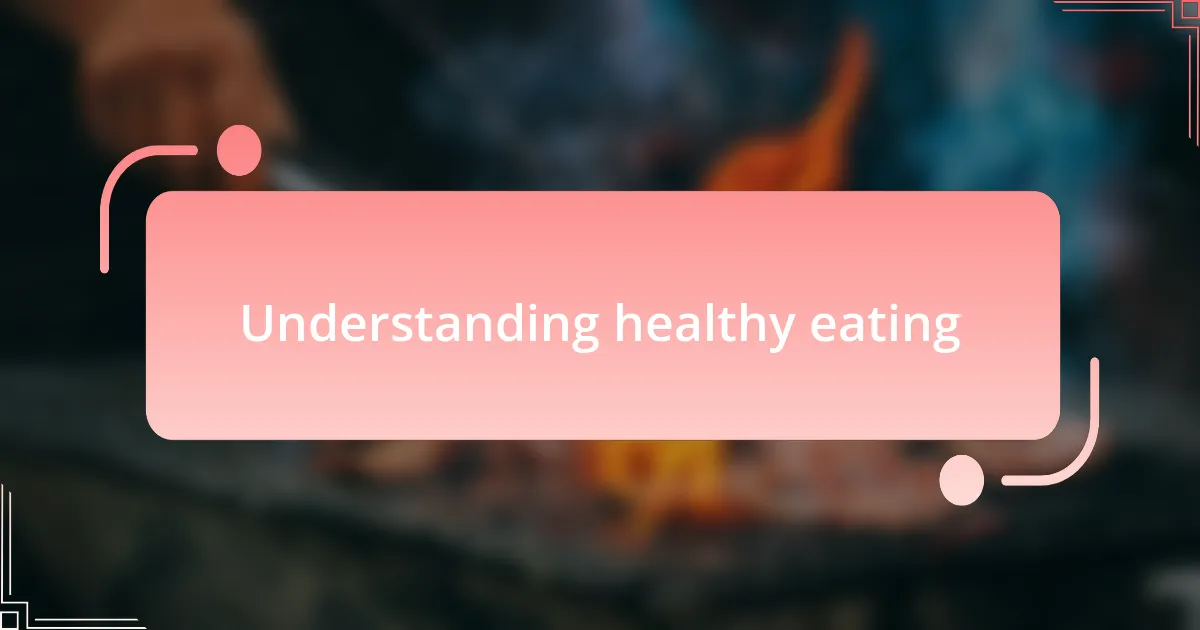
Understanding healthy eating
Healthy eating is often viewed through a narrow lens of calorie counting or restricting certain food groups, but I believe it’s so much more than that. For me, healthy eating is about nourishing my body and mind, discovering the joy of cooking with whole foods, and finding balance. I still remember the first time I successfully made a vibrant quinoa salad; it felt like I was truly connecting with my ingredients.
There’s a certain thrill in understanding what your body needs. I once experimented by tracking how different foods made me feel throughout the day. It was eye-opening! I realized that not all calories are created equal; some made me energetic while others left me sluggish. This journey led me to embrace a wide variety of fruits, vegetables, and plant-based proteins, which became staples in my pantry.
The emotional aspect of healthy eating can be profound. I often reflect on how sharing home-cooked meals with friends and family not only strengthens bonds but also cultivates a sense of community and support. Have you ever considered how your food choices impact your mood? I’ve found that when I choose vibrant, nutrient-dense foods, my overall well-being improves, making the effort truly worthwhile.
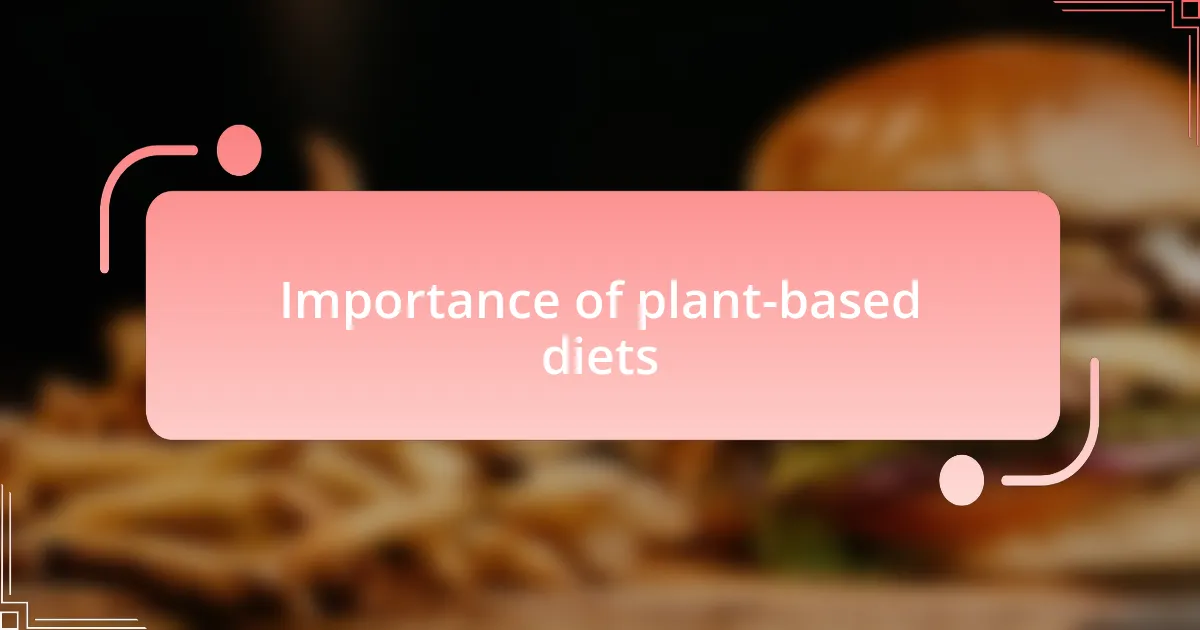
Importance of plant-based diets
Embracing a plant-based diet has transformed my view on nutrition. I remember the first time I tasted a rich, homemade lentil soup packed with spices and vegetables. It was astonishing to feel so satisfied and energized by a meal perfectly crafted from nature’s bounty. Plant-based foods are not only nourishing but also vibrant, offering a diverse palette that makes every meal an adventure.
One aspect that often surprises people is the impact of these foods on overall health. After switching to a mostly plant-based diet, I noticed a dramatic decrease in my energy dips throughout the day. Have you ever felt that afternoon slump? I realized that by fueling myself with whole grains, legumes, and plenty of greens, I was able to maintain consistent energy levels, which made my daily activities much more enjoyable.
Moreover, the environmental benefits of choosing plant-based meals cannot be overlooked. Each time I opt for vegetables over meat, I feel like I’m making a small yet meaningful contribution to the planet. It’s an empowering choice! Have you thought about how your diet affects the environment? I often find myself reflecting on how my food choices echo beyond my plate, and it inspires me to continue exploring this vibrant way of eating.
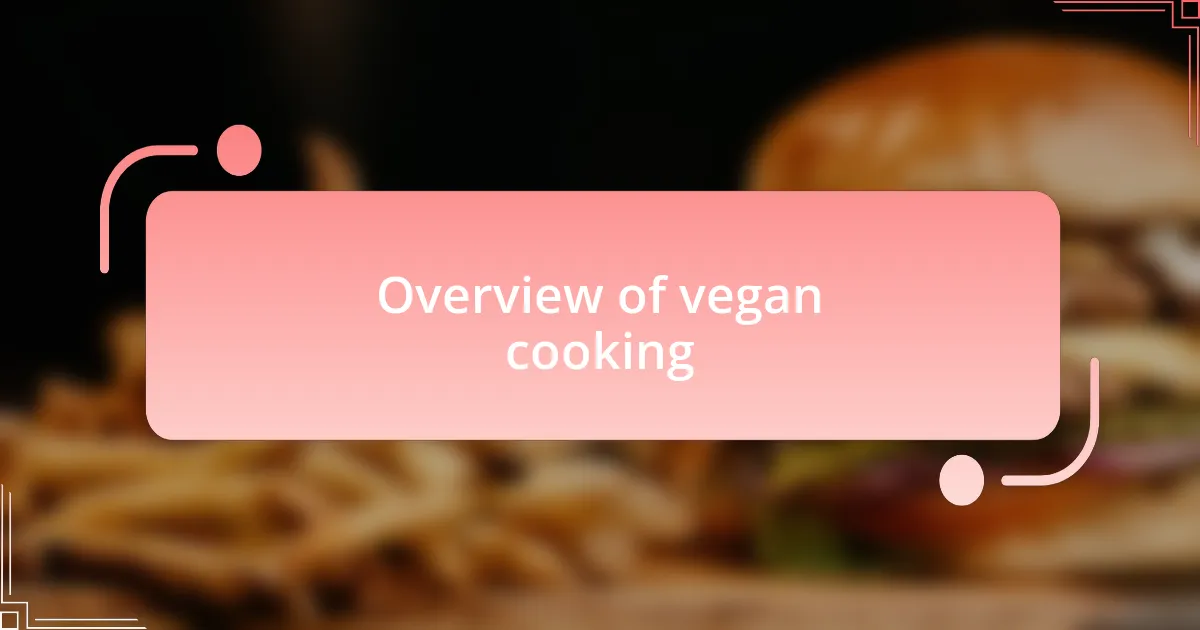
Overview of vegan cooking
Vegan cooking is a fascinating journey that opens up a world of flavors and creativity. I still remember the first time I successfully turned traditional comfort foods, like mac and cheese, into a creamy, plant-based delight using cashews and nutritional yeast. That moment ignited my passion for experimenting with diverse ingredients, showing me that one can enjoy familiar flavors without animal products.
As I delved deeper into vegan recipes, I encountered unique challenges, particularly in achieving texture and flavor balance. Have you ever tried baking a vegan cake? The first one I made felt like a science experiment gone wrong, but through perseverance, I eventually nailed the perfect combination of flaxseed meal and baking soda to create something fluffy and delicious. It taught me that sometimes, trial and error is the secret ingredient to not just vegan cooking, but any culinary adventure!
Understanding nutrition in vegan cooking is equally important, as it challenges the misconception that plant-based diets lack essential nutrients. While crafting a balanced dish, I often find myself consulting a variety of resources to ensure I’m meeting my health needs. Have you ever felt puzzled about which foods provide adequate protein or iron? I’ve been there too! Incorporating a medley of legumes, nuts, and leafy greens has filled that gap for me, turning each meal into a powerful source of nourishment.
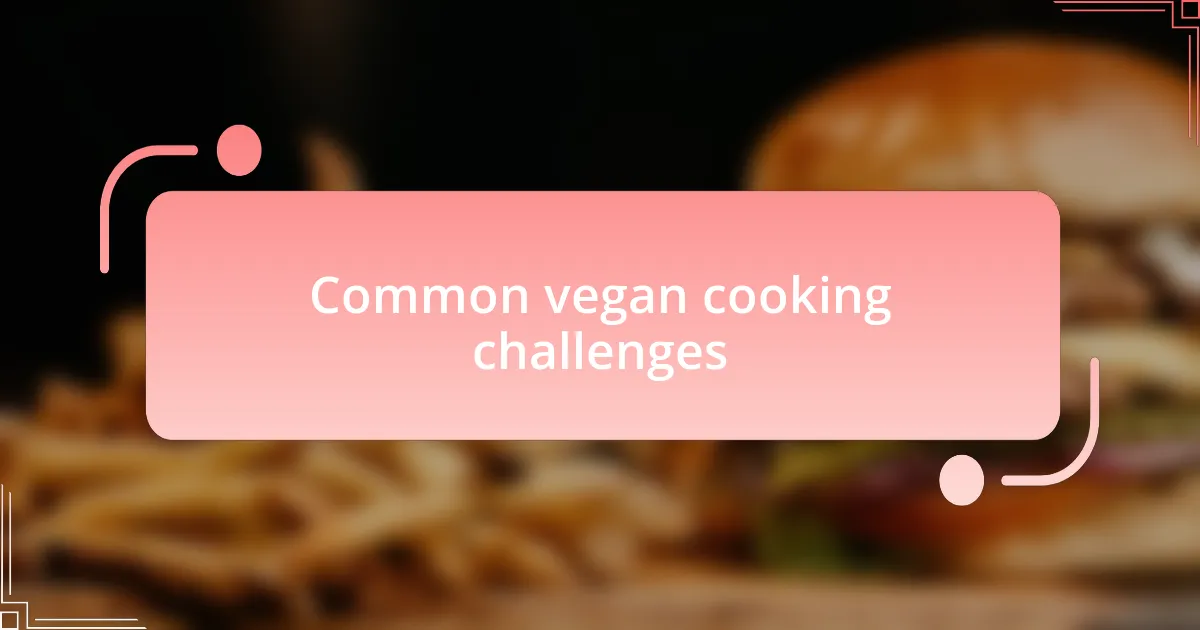
Common vegan cooking challenges
When I started my vegan journey, the most significant hurdle was figuring out how to mimic the flavors of meat. I vividly recall trying to season chickpeas to taste more like chicken for a curry. After several attempts filled with frustration, I discovered the magic of smoked paprika and liquid smoke, which transformed my dish and opened my eyes to the importance of seasoning in plant-based cooking. Why is it so challenging to recreate these familiar tastes? It often comes down to understanding how to layer flavors effectively.
Another common challenge I faced was knowing how to source and prepare substitutes for dairy products. One evening, as I attempted to make a creamy Alfredo sauce using cashews, I realized that soaking them for too short a time left me with a gritty texture that was far from appetizing. The secret, I learned, was in patience—soaking cashews overnight makes a world of difference. Have you ever felt disheartened by a recipe that didn’t turn out as expected? That’s a feeling I know all too well, but it also pushed me to become more resourceful in my kitchen.
Lastly, navigating the realm of baking vegan treats can be particularly overwhelming. I once thought that replacing eggs in baking was straightforward, but after a few dense cookies that could double as doorstops, I learned the importance of finding the right substitutes, like apple sauce or aquafaba. It’s quite the balancing act! Isn’t it fascinating how small changes can yield such different results? This journey through experimentation not only improved my skills but made me appreciate the science behind cooking.
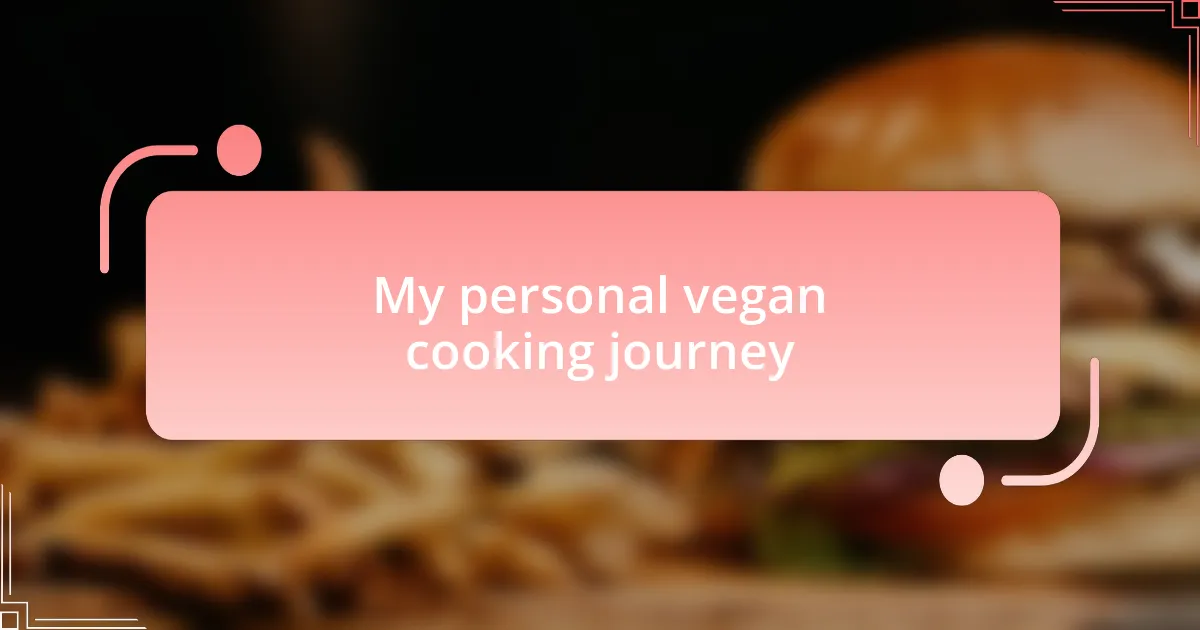
My personal vegan cooking journey
When I reflected on my personal vegan cooking journey, I realized that one of the biggest surprises was the sheer variety of plant-based ingredients available. A trip to the local farmers’ market opened my eyes to colorful legumes, unique grains, and seasonal vegetables I had never tried before. Have you ever tasted a freshly picked heirloom tomato? The explosion of flavor reminded me how vital it is to use fresh, high-quality ingredients in creating vibrant vegan dishes.
Another unforgettable experience was when I attempted to make my first homemade vegan cheese. I remember the excitement—originally thinking it would elevate my pizza night. However, after hours of grating and blending, I ended up with a concoction that barely resembled cheese. That moment taught me that vegan cooking can be a gamble; sometimes, you hit a home run, and other times, you end up with a kitchen disaster. What keeps me motivated, though, is the joy of pushing through those tough moments to discover delightful surprises.
I also found that cooking with friends added a whole new layer to my vegan experience. One evening, we decided to host a cooking party, bringing together our favorite plant-based recipes. The laughter and camaraderie, mixed with moments of trial and error, created an atmosphere of fun and learning. Have you ever shared the kitchen with others? There’s something magical about experimenting together and exchanging ideas that not only enhances your culinary skills but also deepens friendships.
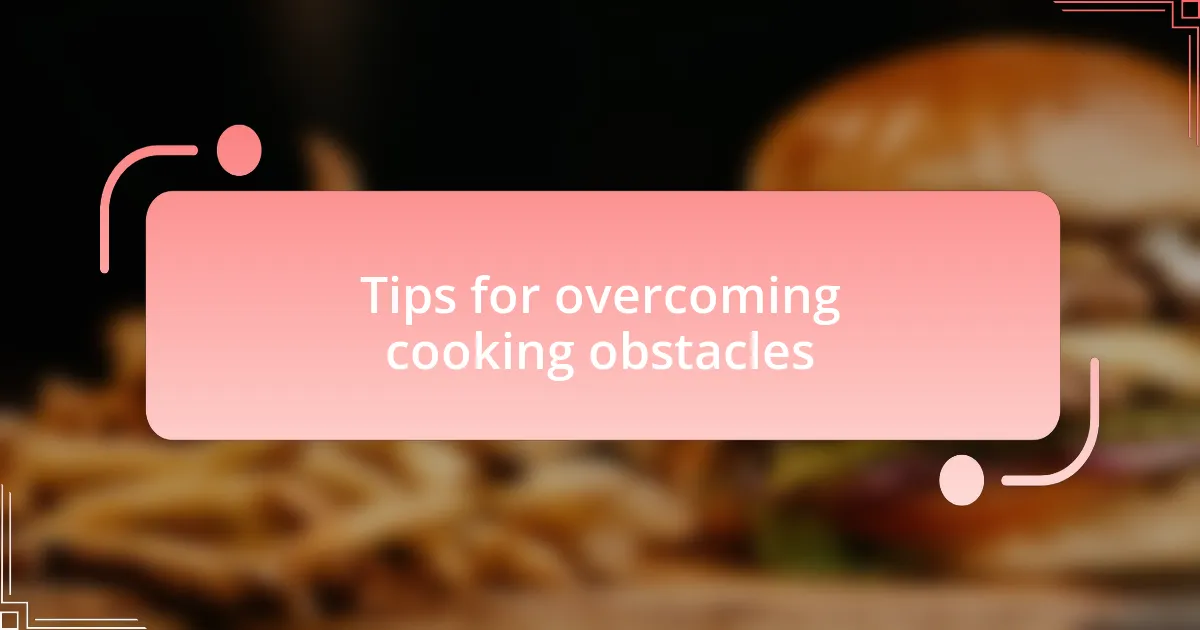
Tips for overcoming cooking obstacles
When faced with cooking obstacles, I’ve found that embracing mistakes can be liberating. I remember a time when I misjudged the cooking time for a hearty quinoa salad. Rather than tossing the entire dish, I decided to repurpose the slightly overcooked grains into a warm filling for stuffed peppers. This experience taught me that flexibility can lead to delicious surprises; sometimes, a supposed failure can turn into a new favorite recipe.
Planning ahead has become my secret weapon for overcoming kitchen challenges. When I started making meal plans, it transformed my approach to cooking. I recall a particularly busy week when I prepped vegetables and grains in advance. Not only did this save me time, but it also took the pressure off when I was too tired to cook. Have you ever found yourself staring blankly into the fridge? Having prepped ingredients ready to go can inspire spontaneity, making healthy eating much more attainable.
I also learned that finding supportive communities makes a huge difference in navigating vegan cooking. Connecting with fellow plant-based enthusiasts, whether online or in-person, helped me discover resources and tips that I hadn’t considered. I vividly remember joining a local vegan cooking class where we tackled a seemingly intimidating recipe together. The shared excitement and encouragement made the process enjoyable, and it reinforced the idea that cooking can be a collective experience rather than a solitary task.
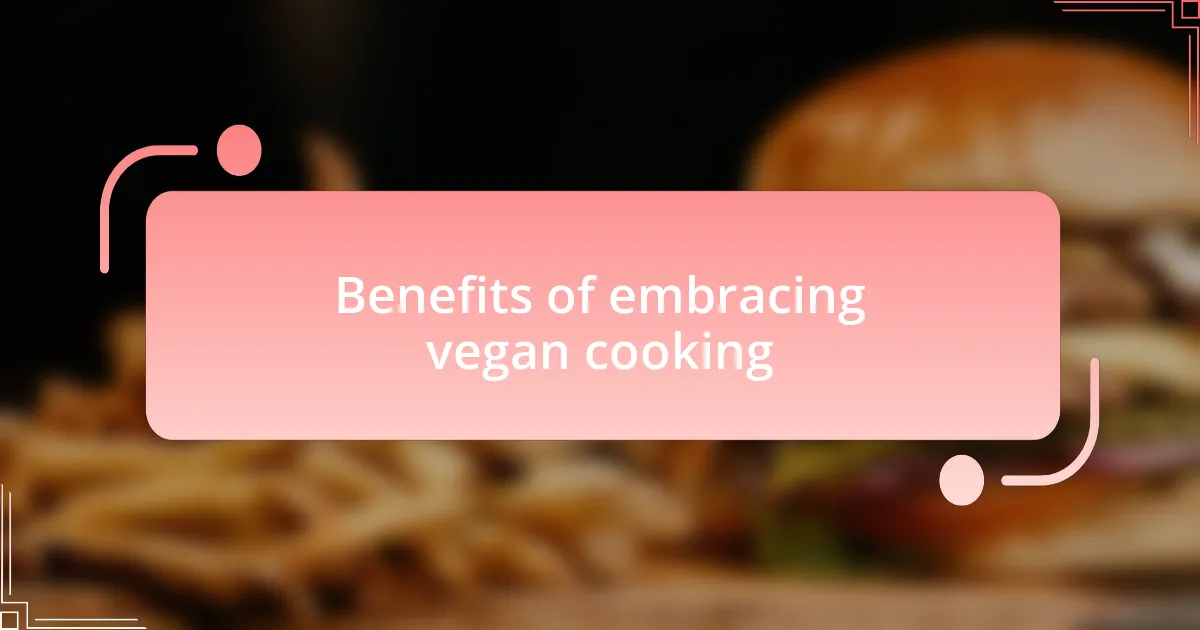
Benefits of embracing vegan cooking
Embracing vegan cooking has transformed not just my meals but my overall way of thinking about food. I remember the first time I experimented with a larger variety of vegetables; it opened up a colorful world on my plate. Suddenly, meals became an adventure, with each ingredient bringing its unique flavor and texture. Have you ever noticed how something as simple as adding fresh herbs can elevate a dish? It’s amazing to see how creativity flourishes when we step outside conventional cooking norms.
One of the most significant benefits of vegan cooking is the positive impact on health. Since I shifted to a plant-based diet, I’ve experienced increased energy levels and better digestion. I reflect on how easily I used to feel sluggish after heavy meals, but now, a hearty chickpea stew leaves me feeling satisfied yet light. It’s like rediscovering what nourishing food truly feels like. Can food really change how we feel? I wholeheartedly believe it does.
Lastly, cooking vegan fosters a deeper connection to the environment. I was surprised by how aware I became of ingredient sourcing. For instance, choosing seasonal produce reminded me of a local farmer’s market where I met passionate growers. Their stories added layers to the food I prepared, enhancing my appreciation for what I was cooking. Isn’t it rewarding to know that our culinary choices can contribute to sustainability? This awareness has instilled a sense of purpose in my kitchen.